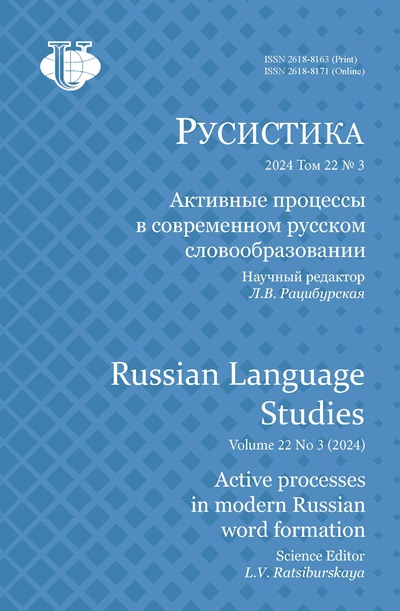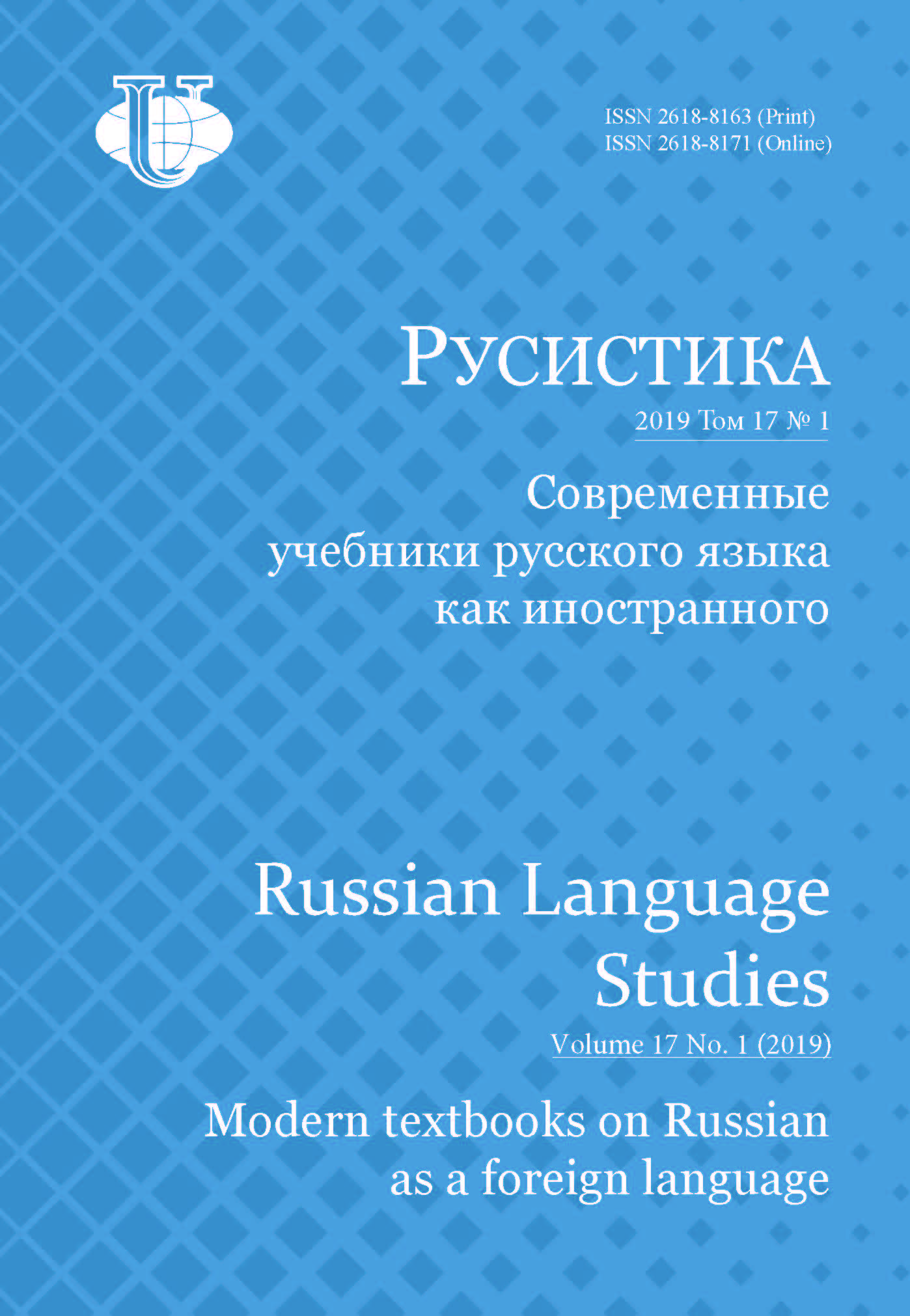Том 17, № 1 (2019): СОВРЕМЕННЫЕ УЧЕБНИКИ РУССКОГО ЯЗЫКА КАК ИНОСТРАННОГО
- Год: 2019
- Статей: 9
- URL: https://journals.rudn.ru/russian-language-studies/issue/view/1159
- DOI: https://doi.org/10.22363/2618-8163-2019-17-1
Весь выпуск
Обзорная статья
Поиски «золотого ключика» (проблемы современного учебника русского языка как иностранного)
Аннотация
В статье представлены обобщенные и критически осмысленные проблемы современного учебника русского языка как иностранного (РКИ). Выявлены его сущностные характеристики и функции. Учебник РКИ отражает особенности обучения русскому языку на определенном этапе развития науки. Важная характеристика такого учебника - способность моделировать (с одной стороны, упрощенный, а с другой, идеализированный) педагогический процесс, обеспечивать взаимодействие преподавателя и студента. Учебник РКИ структурирует подачу иноязычных знаний, организует процесс поэтапного формирования речевых навыков и умений. В нем реализуется информационная функция, а в единстве его внешней и внутренней структур может быть реализована мотивирующая функция - соотношение «внешней привлекательности» учебника (бумага, шрифт, цветные иллюстрации и т.д.) и четкой структурированной подачи материала с необходимыми обобщениями и систематизацией полученной информации. Практическая (коммуникативная) направленность - существенная характеристика учебника РКИ, в котором также находит свое отражение дифференцированный подход к контролю и обучению, что позволяет говорить о контролирующей функции учебника. В статье дано краткое описание разных поколений учебников. Анализ научной и учебной литературы позволяет обосновать методическую необходимость создания энциклопедии для авторов учебника русского языка как иностранного, где будет обобщен опыт фундаментальных исследований в области обучения иностранным языкам и русскому языку как иностранному.
 7-28
7-28


Методика преподавания русского языка как иностранного
Профессиональная лексика в учебном пособии по русскому языку как иностранному: из опыта обучения иностранных военнослужащих
Аннотация
Преподаватели русского языка как иностранного все чаще обращаются к современному международному опыту обучения иностранным языкам. В связи с этим актуальным видится пересмотр методических подходов и приемов обучения новой лексике, которые инерционно используются в отечественных учебных пособиях. Целью данной статьи является комплексный анализ существующего опыта методического сопровождения работы с лексикой, составления учебных и учебно-методических пособий, в которых отражаются авторские концепции введения и закрепления новой лексики. В качестве материала используются пособия, созданные коллективом преподавателей кафедры русского языка филиала ВУНЦ ВМФ «Военноморская академия» в Калининграде. Анализ показал, что наиболее эффективными приемами работы с лексикой являются предварительная отработка грамматических тем на общеупотребительной лексике с последующим включением текстов по специальности, введение новой лексики в более широкие контексты, использование типовых грамматических и когнитивных моделей, увеличение доли заданий, направленных на текстопорождение.
 29-41
29-41


Учебник русского языка как иностранного: на перекрестке путей, мнений, интересов
Аннотация
Статья посвящена вопросам разработки учебников и учебных пособий по русскому языку для иностранных слушателей этапа довузовской подготовки российских вузов. В настоящее время во многих университетах России используются учебно-методические комплексы (далее - УМК), созданные авторскими коллективами преподавателей этого вуза. Актуальность данного исследования обусловлена необходимостью проанализировать результаты во многом стихийного процесса разработки и внедрения разрозненных учебных пособий в учебный процесс в отдельном вузе. Материалом для исследования послужили учебники и учебные пособия по русскому языку, изданные в Институте международного образования Воронежского государственного университета (далее - ИМО ВГУ) в период с 2000 по 2017 г. Целью исследования является обоснование комплексного подхода к разработке учебников и учебных пособий, что предполагает решение ряда задач, а именно: на основе анализа сложившейся практики разработки и использования учебников, учебных пособий, других учебных средств/ресурсов (на примере ИМО ВГУ) определить оптимальную структуру учебного комплекса по русскому языку как иностранному (далее - РКИ) для довузовского этапа обучения, охарактеризовать принципы распределения учебного материала внутри него и выявить перспективные направления в разработке учебных пособий и электронных ресурсов (как сопровождающих, так и автономных по отношению к основному учебнику учебно-методического комплекса). Результат данной работы заключается в определении оптимальной структуры УМК по РКИ второго поколения и особенностей распределения учебных материалов внутри основного учебника, а также между составляющими его учебниками и учебными пособиями. В заключении содержатся выводы о необходимости в равной мере следовать традиционным (концентризм и минимизация) и относительно новым («диалог культур», градация учебного материала по признакам информативной значимости и частотности) методическим принципам.
 42-62
42-62


Реализация принципов научной школы методики преподавания русского языка как иностранного в учебниках МАДГТУ (МАДИ)
Аннотация
Статья посвящена истории и современному состоянию научно-методической школы преподавания русского языка на подготовительном факультете для иностранных граждан Московского автомобильно-дорожного государственного технического университета (МАДИ), основы которой были заложены в 60-е годы ХХ века. Основными принципами школы признаются: приверженность деятельностно-коммуникативному и национально ориентированному подходам, обязательность обучения научному стилю речи и языку будущей специальности, необходимость межпредметной координации при создании учебников и пособий по научному стилю речи, разработка и использование в учебном процессе собственной учебной и методической литературы, создание условий, необходимых для интеграции иностранных обучающихся в социокультурную, языковую и образовательную среду российского вуза. В статье приводится краткий исторический обзор ведущих представителей научной школы с описанием наиболее важных результатов их научной и учебно-методической работы. Особое внимание уделено анализу учебно-методического комплекса «Русский язык будущему инженеру», эффективность которого подтверждается с помощью таких критериев, как самодостаточность и неизбыточность материала, приращение коммуникативных навыков, успешность мотивации обучающихся, удачная функциональная схема учебных действий. В качестве основного направления будущих исследований лингводидактической школы МАДИ предлагается развитие электронных средств обучения на базе имеющихся методических наработок.
 63-77
63-77


Каким должен быть учебник по русскому языку как иностранному для взрослых учащихся
Аннотация
Статья посвящена описанию принципов построения современного эффективного учебника по русскому языку как иностранному (РКИ) для взрослых учащихся с позиции языковой андрагогики (Adult Learning Theory). Актуальность данной темы связана с тем, что на рынке методических и учебных пособий отсутствует настоящий, эффективный учебник по русскому языку как иностранному для взрослых. Cуществующие учебные пособия ориентированы прежде всего на студентов и молодежь. Они часто не соответствуют настоящим потребностям взрослых учащихся. В статье рассматриваются основные элементы учебника по РКИ, определяются его функции, содержание, методика и структура, а также основные положения теории языковой андрагогики. На конкретных примерах показаны главные недостатки существующих учебников по РКИ. Выявлены принципы построения современного учебника для взрослых: представлены функции такого пособия, описано содержание, определен метод и очерчена его структура.
 78-89
78-89


Школьные учебники русского языка в Чехии сегодня: плюсы и минусы
Аннотация
В статье рассматривается современное состояние учебной литературы по русскому языку в чешской начальной и средней школе. Русский язык изучается в школах Чехии в качестве второго и третьего иностранного языка, что определяет цели, задачи, содержание, методическую концепцию построения учебно-методических комплексов, принятых в преподавании иностранных языков. Авторы останавливаются на требованиях к современному учебнику русского языка как иностранного, основных критериях его оценки, особенностях при обучении в близкородственной языковой среде. Среди учебников «нового типа» следует выделить электронный учебник и интерактивный учебник, которые начинают появляться в аудиториях, однако ещё не все учебники отвечают духу времени. Анализ учебно-методических комплексов, используемых в школах Чешской Республики, выявил их положительные и отрицательные стороны, подтвержденные данными опроса, проведённого среди учителей русского языка в чешских школах.
 90-102
90-102


Страничка молодого ученого
Учебники по русскому языку как иностранному: из опыта работы на подготовительном факультете в Северо-Восточном федеральном университете имени М.К. Аммосова
Аннотация
В статье анализируются учебники и учебные пособия по русскому языку как иностранному, используемые в практике преподавания на подготовительном факультете в Северо-Восточном федеральном университете имени М.К. Аммосова в Якутске. В качестве критериев оценивания учебников (учебных пособий) выбрана классификация, предложенная А.А. Акишиной, О.Е. Каган и включающая следующие параметры: цель, набор учебных текстов, достаточность и эффективность упражнений, коммуникативная направленность упражнений, использование аутентичных текстов, создание словаря, презентация грамматики, применение аудио- и видеоприложений. В ходе анализа раскрываются достоинства и недостатки учебников с позиций современных требований к организации учебной деятельности в иностранной аудитории. Выявляются проблемы, возникающие при непосредственном взаимодействии учащегося и преподавателя при реализации задач в разных организационных формах: на уроке, при подготовке домашней работы, участии во внеклассной работе. Особое внимание уделяется единственному учебному пособию по русскому языку как иностранному (авторы - коллектив преподавателей Якутского государственного университета (1996 г.)), которое может служить основой для создания учебника с национально-региональным компонентом.
 103-114
103-114


Хроника
Всероссийский съезд учителей русской словесности (Москва, Россия, Московский государственный университет имени М.В. Ломоносова, 7-9 ноября 2018 года)
 115-119
115-119


Рецензия на учебное пособие по русскому языку для иностранных студентов гуманитарных специальностей (II сертификационный уровень) «Россия вчера и сегодня»
 120-123
120-123















